Breaking Bad: Chasing the Wildest Con Artist in Farming History

Like last bits of skin clinging to gaunt ribs, yellowed plastic holds stubbornly to the skeletal frame of a greenhouse vault as Mitchell Kelley looks at the decrepit shell and shakes his head. “There have been a lot of dirty scams in farming, but this is the damnedest one I’ve ever heard of. You want to meet the devil? Go find Jamie Lawhorne; he’s got everything but the horns.”
Agriculture’s most outrageous crime story is seemingly copied from the script of a Coen brothers’ film. Spanning multiple states, three years, a motherlode of hijinks, bounty hunters, and enough greenbacks to choke a dozen mules, hundreds of small farmers were hustled by the saccharine sweetness of a con artist selling a towering pyramid of lies.
Pulled straight from central casting, Jamie Lawhorne lit the fuse on a bizarre swindle and then went on the lam, stumbling from one misadventure to the next, leaving behind a telltale trail of tomatoes, worms, pickles, shattered growers and financial ruin. Wearing overlapping shades of Walter White, P.T. Barnum and Elmer Gantry, Lawhorne took a grow-for-the-green swindle and turned it into one of the most outlandish episodes in farming history. “I’m not sure if anyone will believe it,” Kelley adds “but it’s one helluva tale.”
Lemmings off a Cliff
In early 2013, Marguerite McClintock was operating Alchemy Farms and Plants in Hampton Cove, just southeast of Huntsville in northcentral Alabama, when Lawhorne blew in from nowhere, almost landing on her doorstep, trumpeting an extensive agriculture background and sizeable family farm. In an office building across the street, catty-corner from McClintock, the charming carpetbagger set up Cypress Creek Organic Farms—the engine that enabled him to drain over $2 million from the surrounding area in just eight short months.
By radio, billboard and Facebook, Lawhorne offered a golden goose to farmers and small business owners—$25,000 to $40,000 of income per year growing organic tomatoes, backed by a direct advertising pitch: “Cypress Creek Organic Farms needs farmers now. Work From Your Home FARM Business.”
At 50, Lawhorne casually blended into crowds with a nondescript figure—medium height, slight build, moustachioed, balding gray hair—and used the traits to his advantage. “He didn’t really have much of a southern accent, and he was so common you’d barely notice him, except for his strong confidence,” McClintock remembers. “No matter how crazy things got, he always had a reasonable explanation.”
John McMillan, Commissioner of the Alabama Department of Agriculture and Industries, says the Cypress Creek affair has no parallels. “In my career, I’ve never encountered anyone as slippery as Lawhorne. Frankly, I’ve never even heard of anything this tangled or twisted happening anywhere, anyplace.”
For a one-time fee of $9,950, “affiliates” were promised a greenhouse (100’ x 20’ high tunnels covered in plastic sheeting), 100 hours of training, buyback of all tomatoes at organic market value, daily pickup of product, free provision of organic seedlings each year, and guaranteed USDA organic certification. On the flip, according to Lawhorne, major grocery chains (Publix, Bruno’s) were contracted and waiting to gobble up every tomato Cypress Creek could procure. In 2013, while the farm economy slid toward a deep rut, Lawhorne offered water to the thirsty: a steady stream of secondary income.
Positioned adjacent to Alchemy Farms, Lawhorne proposed to build a greenhouse on McClintock’s land, and allow her to pay it off in produce, in lieu of cash, provided Lawhorne could use it as a model. Within weeks, the demonstration site was drawing potential affiliates stretched from southern Tennessee to Birmingham. The Ponzi was cranking into gear. “I was a Cypress Creek demo. It was astounding because so many people started coming over to see the greenhouse. Row crop farmers, teachers, and retired people came almost like in tours, all sucked in by what Jamie promised,” McClintock explains. “Looking back now, it was crazy, kind of like watching lemmings drop off a cliff.”
Art of the Lie
In March 2013, Mitchell Kelley, 53, clicked a Cypress Creek advertisement on Facebook, dialed the phone number, and listened as Lawhorne tickled his ear with a tomato pipedream: Grow’em, pick’em, put’em in a box, truck collects’em; and it’s a surefire $25,000-plus. Lock, stock and smoking barrel.
“I went to meet Lawhorne shortly after and there were no alarm bells. Nothing sneaky or odd. Nothing stood out. Seemed like a harmless guy starting a business,” he says.
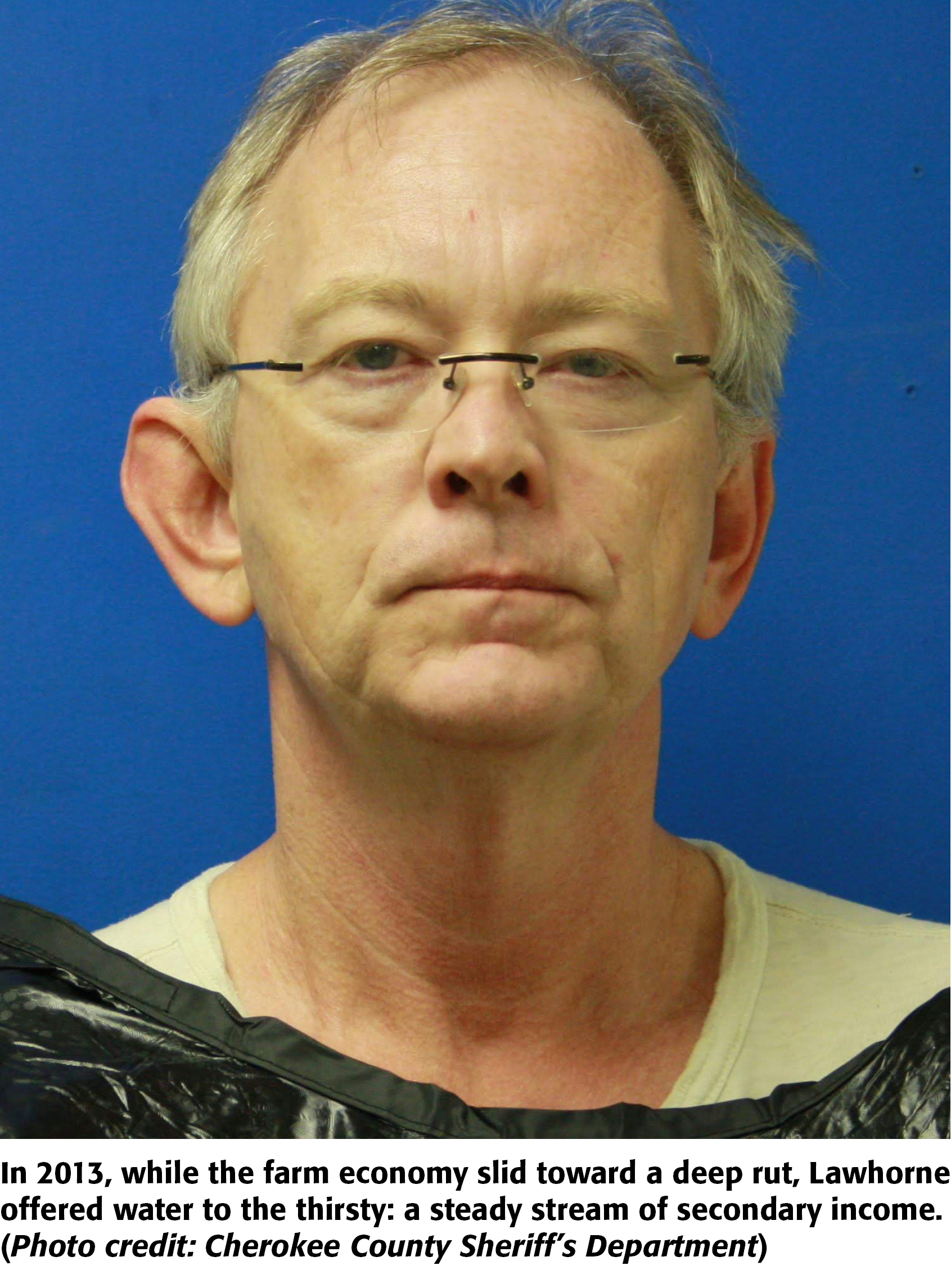
Kelley, a medical inspection company worker in Morgan County, obtained a bank loan for $10,000, signed a Cypress Creek affiliate contract, and prepared to grow tomatoes year-round at $2.50 per pound. Lawhorne played Kelley as he did most marks, coating the process in a scientific veneer by requesting a soil sample from the proposed greenhouse site for testing at Auburn University. “It was really weird because he asked me to deliver the soil sample to a house address and leave it on the front porch,” Kelley recalls.
Kelley had no inkling: His dirt likely ended up in a soil sample graveyard in Hampton Cove. Witnesses would later testify to Alabama authorities that Lawhorne sometimes chunked affiliate soil samples out the backdoor of the Cypress Creek office. The samples were merely a hook and a means to add a layer of credibility. Simply, claims of Auburn soil testing were a lie.
Out of the gate, the venture started square on Kelley’s land. Lawhorne sent a crew to build the greenhouse and Kelley watched in delight as the tomato plants climbed 13’ high. “Hell, I told him I wanted two more greenhouses right away. If he’d acted faster, I’d have been out $30,000. But’s that when Lawhorne disappeared and I literally never set eyes on him again.”
“He never gave a s*** about hurting us or taking our money.”
Stacking the Pyramid
A month prior to Kelley’s misfortune, in early February, Cliff Wooten, 36, owner of Grateful Acres farm in St. Clair County, spotted a Cypress Creek ad on Craigslist, and emailed Lawhorne. Wooten was already growing to organic standards, but USDA certification and the promise of a long-term tomato contract were irresistible. Lawhorne responded with a silver tongue: Up to $45,000 per year, 85% royalty on $2.85 per pound, and a 10-year contract.
A few weeks later, Lawhorne arrived at Grateful Acres—in khaki slacks, a polo shirt and leather loafers. “I should have smelled the bulls*** right then,” Wooten admits. “What man with a supposed agriculture background walks around a farm in fancy shoes?”
Lawhorne pulled the requisite soil sample and assured Wooten it would be tested by experts at Auburn. Several weeks later, when a Cypress Creek van delivered a load of seedlings to Grateful Acres, the driver exited the vehicle, followed by a nicotine cloud. “It started bad right there,” Wooten says. “A van full of tomato seedlings soaked in cigarette smoke. What more can you say?”
Wooten, Kelley and scores of other growers didn’t realize Lawhorne had triggered a system designed to fail. Assurances of USDA organic certification were false. Contracts with Publix, Bruno’s and other grocery chains were fiction. The daily produce pickup system was a farce. Soil sampling was a fabrication. Lawhorne stacked the pyramid ever higher with $10,000-contracts while bleeding out the base, and when the clock struck midnight, he would bounce out of town.
“He was pushing so hard,” McClintock recalls. “Selling so many greenhouses and basically doing nothing else. Certification and training? All these affiliate growers had questions and frustration building, but he was charging ahead, making sale after sale.”
Wooten clearly remembers the first time he heard a Cypress Creek jingle on the radio and realized the scale of advertisement: “Lawhorne was advertising everywhere. That’s when I knew it was beyond oversold and I got chills up my spine. How many people was he bringing in and how could he handle that many tomatoes?”
Keeping Up Appearances
In August 2013, while surfing online for job prospects in an all-night coffee shop in Chattanooga, Tenn., Garver Akers spotted a post for an agriculture opening in Huntsville. The next morning, he dialed the advertised phone number and spoke directly with Lawhorne. On Aug. 5, Akers began a stint as Cypress Creek’s organic horticulturist. “The main office was impressive, with nice conference rooms and smaller offices for staff and a big digital screen for presentations,” Akers details. “From the start, I thought it was absolutely legit, and that’s one of the most tragic parts—the company could have worked if not for Lawhorne.”
Cypress Creek utilized a fleet of large white vans to ferry supplies and pick up produce from affiliates. The drivers began transporting Akers to meet growers and inspect tomato progress, but with each visit, he noted prolific fungal disease symptoms and heavy insect presence: “The tomato plants were a disaster because the greenhouse builders were just augering holes in the ground and dropping in low-quality castings, and the results were awful, especially for growers with harder, clay-packed soil types. I requested soil sample test results several times, but never saw any at all.”

Akers assumed his new Cypress Creek job role entailed proper tomato production and best management assistance to growers. Instead, his presence was a means for Lawhorne to feign agronomic legitimacy; a cover. Lawhorne was hell-bent on sales, and he would keep the band playing as long as possible, regardless of what improprieties Akers uncovered in the affiliate greenhouses.
Only a few weeks after arriving, Akers’ suspicions mounted. “I walked into Lawhorne’s office, sat down, and said, ‘I'm seeing symptoms of at least a half a dozen fungal diseases, and tons of insect pressure in all of the greenhouses.’”
Akers explained to Lawhorne why the disease and stress were due to a lack of soil preparation and proper plant care: "You simply cannot grow successful tomato plants this way."
Lawhorne stretched backward in his chair for several seconds and looked deep in thought, according to Akers, then leaned forward and spoke words that burned into Akers’ memory, “Garver, your job, now, is to convince these growers that these problems are their fault, and not ours, so that we can sell even more products (organic pesticides, herbicides, soil amendments).”
“Jamie, I won’t do it,” Akers shot back.
Lawhorne switched tracks and threw up a typical detour: “Well, just come up with a new plan and get back to me.”
A Feast for Chickens
With the swindle running full-steam and the pyramid groaning with the compounded weight of new growers, Lawhorne had scant time for the inconveniences of agronomy or horticulture. Even more striking, Lawhorne had no concern for the physical tomato product, yet at least a few of the early-adopter affiliates were beginning to produce a crop: Beyond a few local restaurant purchases, where were all the tomatoes going? Where was the lifeblood of Cypress Creek?
On multiple occasions, Cypress Creek sent trucks to collect tomatoes from Wooten. As he describes, the pickup was bedlam. No specification on tomato variety, grading, size, or condition. No questions; no concerns. Without scale confirmation, the driver accepted Wooten’s claims of weight, loaded the tomatoes and drove away with the haul. “We received several payments totaling several hundred dollars, but it was crazy and I wondered how in the hell Lawhorne was selling the tomatoes,” Wooten recalls.
“They were throwing tomatoes out when they were delivered back to the office. There weren’t many, but when they came in, some of the staff actually threw the tomatoes outside,” Akers contends. “With no real contracts, Lawhorne sure didn’t need’em.”
Lawhorne also fed at least some of the tomatoes to chickens. McClintock’s poultry feasted on the fare of Cypress Creek. “He would bring over boxes of tomatoes or have me pick them up for the chickens. He said these were ‘tomatoes that didn’t meet the grade,’” she describes.
Lies, Damned Lies and Statistics
Steve Moquin, facility manager at the Huntsville Airport, fell into Lawhorne’s Ponzi trap when a relative gave him a Cypress Creek flyer. Moquin ran the numbers, calculated a minimum of a $20,000 per annum profit, and cautiously approached, visiting a demonstration site and meeting with Lawhorne four times. “Lots of eye contact—extremely friendly guy. He was like a chameleon and I swear you’d never notice him in a crowded room.”
“Lawhorne was so slick and said he had contracts with Publix and Bruno’s to buy every single tomato I could grow. I couldn’t figure out the logistics. They pick up every day driving from Hampton Cove? Didn’t make any damn sense, but so many red flags slipped by me.”
“Everybody has to make money for something to last. Everybody’s got to get happy. I couldn’t see how Lawhorne was gonna get happy with this set-up. I couldn’t have been more wrong.”
As Moquin handed over a $10,000 check for a $2.50 per pound tomato buyback, the curtain was falling on the con. Moquin suspects he was the last mark in line; the final signer of a Cypress Creek contract. His greenhouse went up and Lawhorne’s Ponzi pyramid crashed down. “I was the last. The last. I couldn’t find him and knew I’d been had.”
In only six months, Lawhorne’s spiel reeled in 250 Alabama and Tennessee growers to the astounding tune of at least $2.2 million. Lawhorne operated as the official president of Cypress Creek. His son, Brandon Lawhorne, carried the title of vice-president, and Jackie Wilson, a Huntsville local, was positioned as executive vice-president. Below the trio hovered a mix of lower-tier staff. Who was in the know?
“I hate believing Jackie was in on it, but she was close to Jamie, and I just know she was involved. I think Brandon was also in on it, no question in my mind,” McClintock says.
“Besides Lawhorne, I believe Jackie and Brandon knew all of what was going on, and I thought maybe a couple of others knew as well,” Akers adds.
“All of them at the top were involved,” Wooten contends. “I believe they all knew.”
“The inner circle was aware,” Moquin agrees. “Lawhorne was the one that got the ASC crosshairs, but the entourage knew everything.”
Moquin was pulled into the Cypress Creek collapse, but Laura Watts, an affiliate grower from Cullman County, was a half-step ahead of the fall: “I found out Lawhorne had once orchestrated a similar scheme in Tennessee and knew I had to get my $10,000 back or else.”
On an early August morning, she stood outside the front door of the Cypress Creek office in Hampton Cove, waiting for employees to arrive. When Brandon Lawhorne drove up, Watts demanded her money and threatened to call police.
According to Watts, Brandon Lawhorne offered to give back $5,000. “I went toe-to-toe with him and screamed until he gave in.”
“I took Brandon to the bank and we waited for it to open. It was quite a scene because the tellers knew Brandon was under duress, but I got a cashier’s check and drove straight to my bank to make the deposit. I felt awful because maybe I was the last to get my money back. Everyone needs to understand, Jamie Lawhorne was a sociopath.”
The Great Tomato Caper
In July 2013, the Alabama Securities Commission (ASC) received an inquiry from the Madison County Better Business Bureau related to Cypress Creek’s representation and Lawhorne’s claims. The case fell into the lap of Special Agent Charles Traywick, a top-notch seasoned veteran with service at the Criminal Investigation division of the Internal Revenue Service: “Lawhorne was already associated with old cons in Tennessee. Usually these cases take years to unfold, but he was so bold with the greenhouses, and it’s really rare for schemes to happen this fast.”
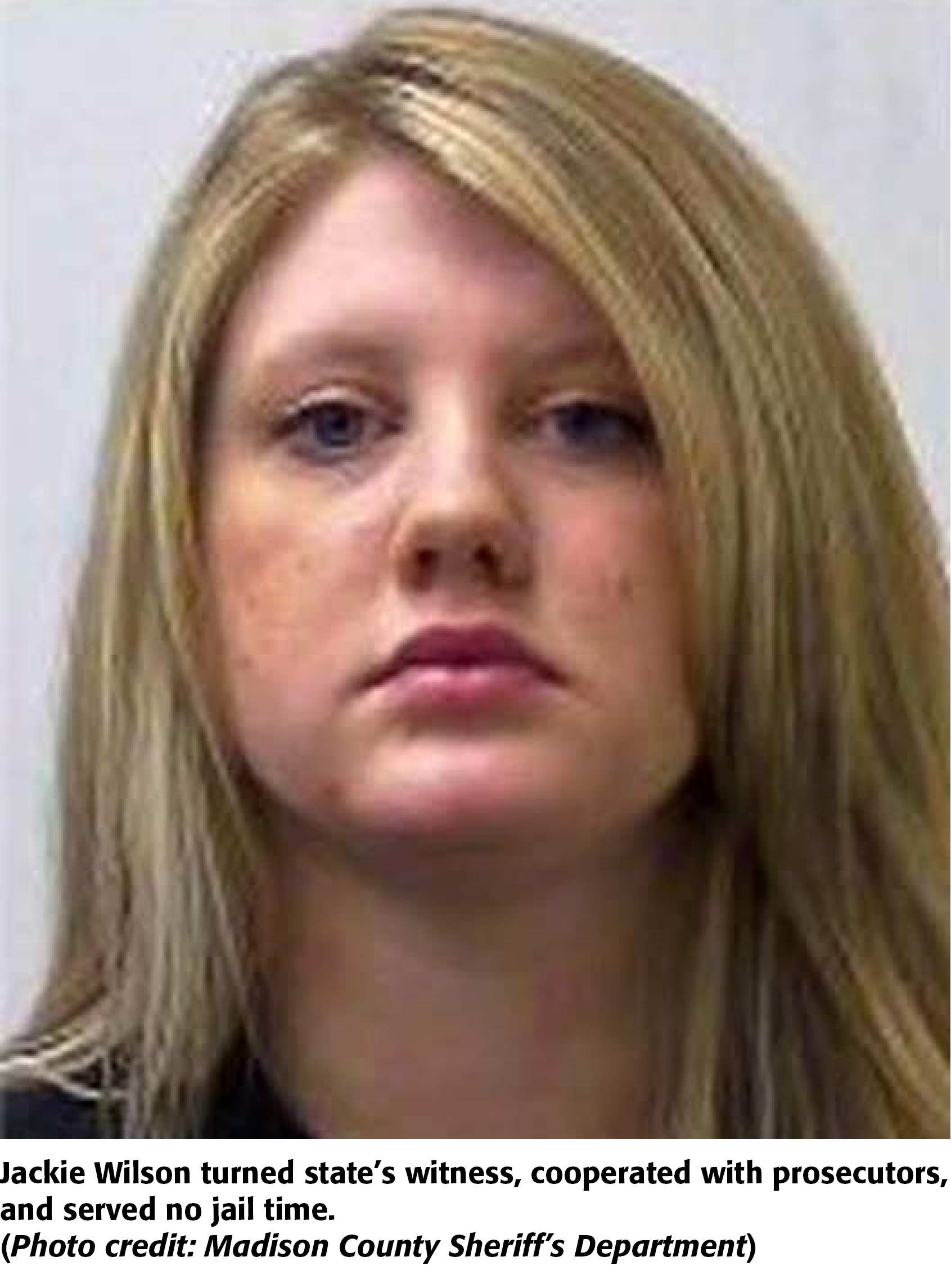
Traywick contacted several Cypress Creek growers and began connecting the dots between affiliates, contracts and Lawhorne’s bank account. The grower checks matched with Lawhorne’s account, according to Amanda Senn, ASC deputy director of enforcement and prosecutor in the case: “It started as a typical white collar investigation. The records don’t lie and there is always a paper trail. However, this case was unusual and it quickly became known as the ‘The Great Tomato Caper,’ with Lawhorne, a crook, at the helm. The scheme was the first of its kind in my line of work and we tend to see it all. Sadly, in the wake of Lawhorne’s scam were 250 victims of securities fraud and a traceable loss of $2.2 million dollars.”
Lawhorne siphoned significantly more than $2.2 million from growers, Traywick explains. “Expenses easily rose above the $10,000 contract for many affiliates. Some people needed a pad built for their greenhouse. Some ran an irrigation setup to the greenhouse or spent thousands cutting down trees to remove shade.”
Take the Money and Run
On Sept. 2, 2013, with the Huntsville news media on his heels and the scheme nearing its death rattle, Lawhorne orchestrated a brazen show of strength at a meeting of 50-plus growers, Cypress Creek staff and several media reps. Intended as a vehicle to buy time and placate growers, the meeting serves as public record of Lawhorne’s audacious assertions. Standing for almost two hours, the con-man faced the cameras and reeled off half-truths in staccato fashion, blindly navigating between fact and fantasy.
Cypress Creek was going major league: “This is going to be a $100-million company. Maybe we’ll be located here in Huntsville, Ala., maybe we’ll go somewhere else close by.”
Federal prison—no problem. Piling on to the remarkably surreal atmosphere, Lawhorne admitted to incarceration as if mentioning the triviality of a parking ticket: “There’s my checkered past …..Yes, guys, yes, I admit, I did get arrested for counterfeiting. I did go to jail and I’m not proud of it.”
Pared down, the meeting was an exercise in self-exoneration, with declarative promises of bigger and better. “This company is going to be massive. We’ll be a $100-million company within five years.”
Catch Me If You Can
In mid-September, while returning from an affiliate visit in Tennessee, Akers got a call from the main Cypress Creek office instructing him to conduct widespread low-level layoffs across the board: “When I got back the office was bedlam and people were running around in total confusion,” Akers recalls. “I sat in my office with several of the van drivers and you could feel the disgust in the air.”
“Jamie walks in with all his back-slapping and fake smiling cheer, and says, ‘Don’t worry at all; this is all BS and we’re a team. Are you on board?’”
Akers was visibly shaking, almost angry beyond control. “No more. No more lies from you while you take advantage of people. I’m done.” Akers walked out of the building and never again laid eyes on Lawhorne.
Despite Lawhorne’s bravado, he couldn’t stop the exit of Cypress Creek employees, shake the northern Alabama media attention, or deflect the pressure from irate growers preparing for frontier justice. He packed his bags, quietly skipped town, and smashed the hopes of 250-plus growers.
A year later, Lawhorne would return to Alabama in shackles, but calendars held little sway with the flimflam man—he operated within phenomenally narrow windows of time. Lawhorne slipped on a new skin, going by the alias Jim Gilley, and set about wreaking havoc in North Carolina. The top hat tomato barker was reborn as an earthworm evangelist.
Musical Chairs
Searching for part-time work in February 2014, retired school teacher Mary Ann Smith came across WormzOrganic on Facebook. As advertised, an “associate” grower could earn $10,000 per year for part-time work, and significantly more for full-time hours. For $4,950, an associate signed a 10-year contract guaranteeing buyback of all worm castings and red wigglers at market prices: $8.25 per sack of castings and $9.30 per pound of worms.
The marketing language was coated in honey: “WormzOrganic provides everything needed. You and your worms produce the organic soil. WormzOrganic buys everything you produce.”
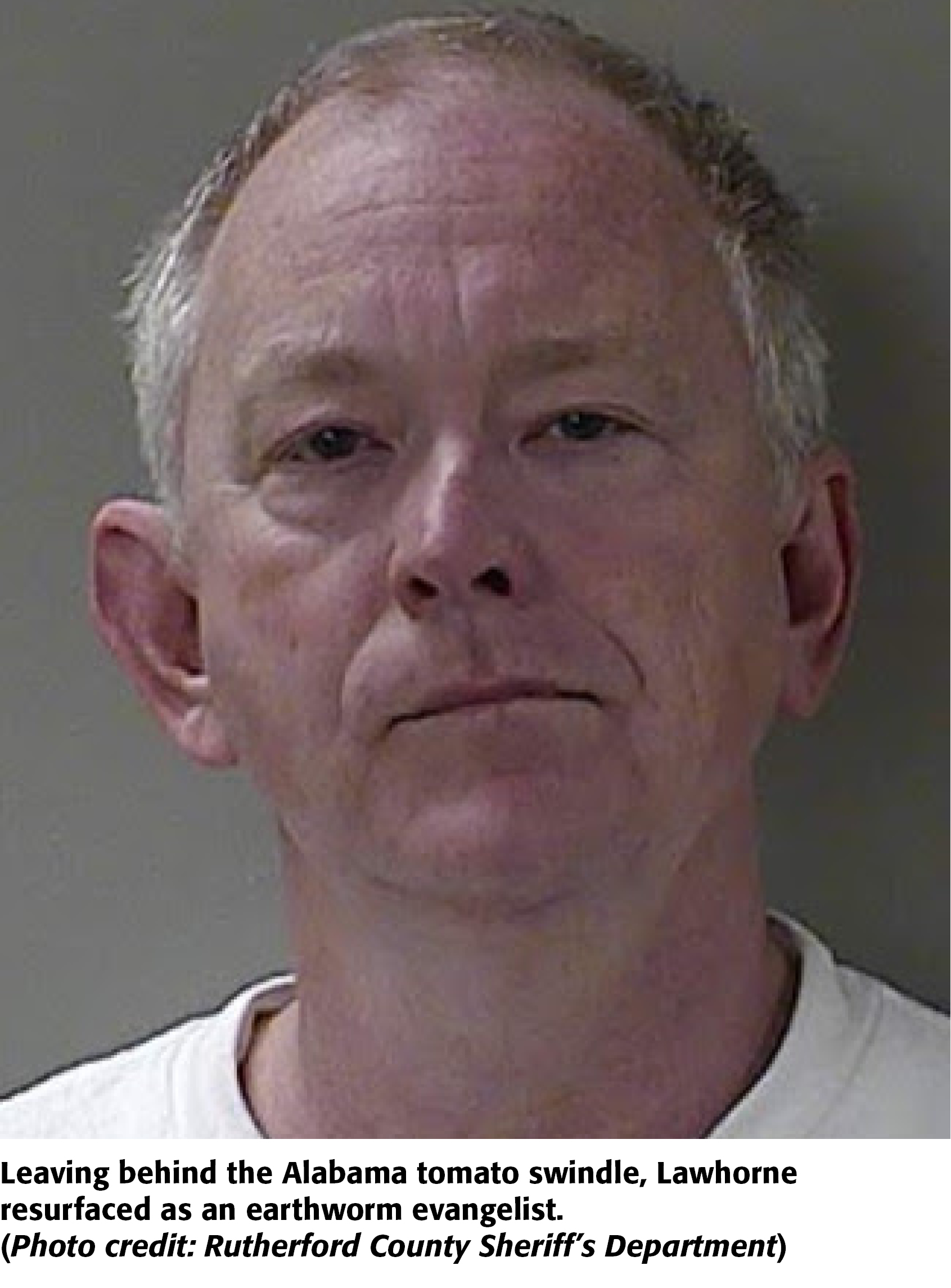
Startup equipment and supplies were provided by WormzOrganic: 60 lb. red wigglers; one-year supply of peat moss, worm food, dolomite lime, and pest control products; rolling harvester table; harvesting screens; unlimited shipping sacks; 60 worm bins; and support, customer service and training. Growers were responsible to deliver buyback castings and worms to WormzOrganic’s office/warehouse in Concord.
According to WormzOrganic advertising, the potential for profit was wide open, depending on scale and labor: “Anyone will be successful if they follow our proven system.” Sixty trays of worms required 1.5 hours of work per day and yielded up to $12,000 yearly; 200 trays meant 4.5 hours of daily work and provided up to $35,000 annually; 900 trays demanded 10 hours of labor per day (split between two people) and might reel in $100,000 per year.
As long as new member contracts dwarfed buyback purchases, WormzOrganic would make money. Sell, sell and sell until the music stops. Lawhorne (aka Jim Gilley) was operating another shell game, based entirely on dead-end worm contracts. He kept a low profile, pulling the business levers off-site.
“At first, none of the associates I’m aware of even knew he existed,” Smith says. “The vast majority of associates never heard the name ‘Jim Gilley’ until later.”
Jennifer Langford was the company president and business face of WormzOrganic. Curious and hopeful, but also a bit gun-shy, Smith took her first tour of WormzOrganic in March, driving to the facility from her home in Waynesville, a full three hours from Concord. “Jennifer told me they were only contracting with a limited number of growers and were nearly at quota. Looking back, it seems like contracts were selling like candy. She said they had contracts with several Fortune 500 companies to buy worm castings,” Smith asserts.
(Langford was contacted by Farm Journal and declined all comment related to WormzOrganic.)
In April, Smith signed on as an associate grower and forked over the payment. “This con was carried out by multiple people beyond Jim Gilley,” she notes. “They scammed way over 100 growers while Gilley was hiding in a nearby apartment. I can’t say for certain who all was involved.”
Red worms hatch in 30 to 60 days and the rate of increase is exponential. With 100-plus growers ramping up production, WormzOrganic was on pace for an arithmetic and geometric explosion. Lawhorne’s worm scam was a facsimile of his tomato scam—but on a heaping dose of steroids. “We were to grow 30 days, harvest, turn in compost and repeat the process, receiving payment for each compost bag. As worms multiplied, you could sell them as well. Very quickly, I could see the math was crazy,” Smith details.
By June, WormzOrganic was in disarray, according to Smith. “Training was a joke and supplies were hard to get. Then Jim Gilley (Lawhorne) stepped out of the shadows where he’d been invisible all this time. He got on the company Facebook page and started giving worm management instructions. I’d never even heard of the man before and he called himself an ‘undercover boss.’ He said he couldn’t be out in the open because people were trying to sabotage him.”
In mid-June, Smith drove to Concord to pick up additional supplies, and found a queue of associate growers outside, waiting to drop off bags of compost for buyback. “There was literally a long line of people with trucks and vans in the parking lot. Beyond disorganization.”
“They took money from way over 100 people trying hard to make extra income: farmers, retirees, semi-disabled, and even a mother trying to find a way to stay home with a child suffering from cancer. It was a heartbreaking and sickening con, just to make a buck,” Smith describes.
Brenda Brown was homeschooling two children outside of Charlotte, with a husband on the edge of retirement, and searching for secondary income when she encountered WormzOrganic. In May, she wrote a check for $4,950 and hopped on the grower train. In less than a month, Brown says she was peppering the WormzOrganic staff with questions—and receiving no answers. “In my opinion, the staff covered for Jim Gilley (Lawhorne) at every turn while he pulled the strings from an apartment somewhere in Concord. It was all delay tactics to draw the whole scheme out.”
Almost the same day Brown was signing a grower contract, Chris McManus drove by the WormzOrganic office and spotted the storefront from the road, purely by chance. McManus, 43, a detective with the Hoke County Sheriff’s Office in Raeford, walked through the WormzOrganic doors and observed a hive of activity and palates of worm castings. “There were people giving demonstrations, and others giving hourly tours. Jennifer Langford was in charge and told me they were taking on growers and had established contracts with Lowe’s and Home Depot to buy worm castings,” he describes.
McManus invested far beyond the $5,000 contract, all in the hope of helping provide an income opportunity for his older, disabled brother (Ronald Lee McManus, 46) who lived on the family farm. McManus paid $8,200 for a pre-fab building to house the worms, followed by costs for wiring, insulation and central air.
“I got in just as things started breaking down. Gilley (Lawhorne) was the mastermind, but he wasn’t running the show from the floor. As many times as I was in that office or as many times as I called on the phone and asked for him, they told me Gilley was out of town at sales meetings with potential clients for the business. I think the whole upper administration was lying to me and knew the truth.”
In mid-June, Donna Hamilton heard the WormzOrganic jingle. Living 30 minutes outside of Concord, and hoping to add a source of side-stream income, she attended orientation alongside McManus and received assurances of massive contracts from major business interests, particularly Home Depot: “Jennifer Langford told me this was being offered to a limited number of people and we needed to sign fast, because they had a quota and once it was filled, they wouldn’t take on more growers. She said they couldn’t produce the worm castings fast enough and had huge, million-dollar worm casting contracts with major companies, but weren’t at liberty to reveal which ones.”
“They claimed to be endorsed by North Carolina State University, and it all had just enough truth to be credible. It was right on the edge of making you believe,” Hamilton adds.
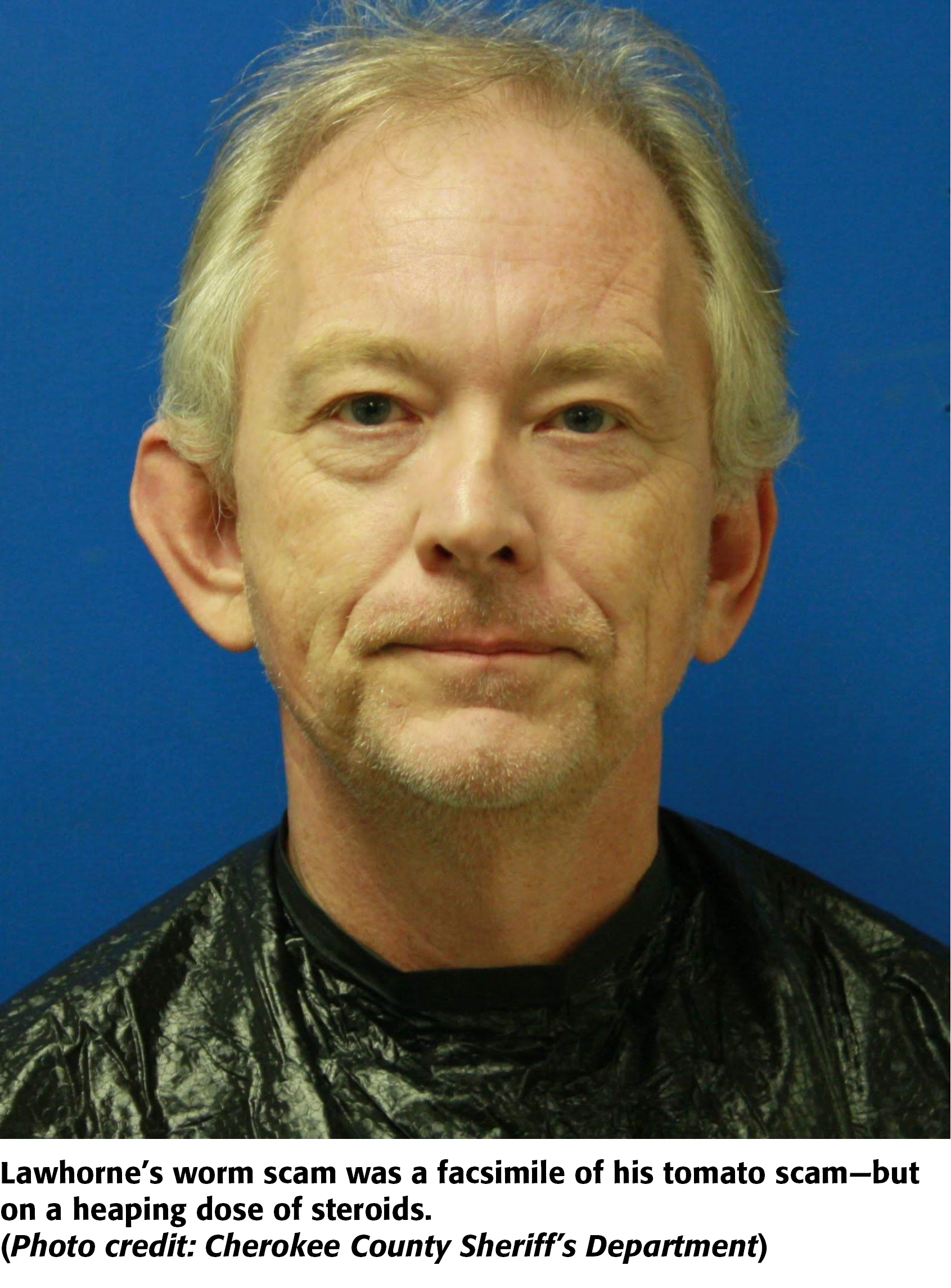
Within days of the scam’s collapse, she took out a loan for $3,000, dipped into savings to make the difference, and returned on June 19. She handed over a $5,000 cashier’s check and signed on as an associate: “I was rushed in and rushed out. They said they were simply ‘behind.’”
Hamilton had just poured her money into a void. Literally, she received nothing in return. No phone calls, training or equipment. Not a single worm. Hamilton walked in on the tail-end of a pyramid scheme.
“The people in the office all denied knowing anything, but they took our money to the very end,” McManus says. “I needed special shelves built for the worms and they accepted a $500 check from me at the beginning of July. Next thing I knew, the doors were locked for good. Nobody was going to give us back our money or tell us where it went.”
Undercover Boss
On July 3, WormzOrganic shuttered and left panicked growers without recourse. Four days later, despite the pandemonium dialed high, the atmosphere skyrocketed to a surreal level. On July 7, Langford sent a six-page email to WormzOrganic associates, pulling the Jim Gilley mask away from Lawhorne, and declaring: “This circus is full of lies, and betrayal, wire taps, bugs and tracking devices, personality traits that include yelling, demanding, bullying and threats, followed by using endearing terms.”
She presented the WormzOrganic operation as a scam perpetrated by Lawhorne, acknowledged that not a single bag of worm castings had been sold to a major company, and announced her pursuit of a restraining order against Lawhorne. Langford proclaimed her innocence, citing “new found” information about Lawhorne. “Due to new found knowledge of the true identity of Jim Gilley, I can no longer work for who I know as Jim Gilley due to his history of illegal and fraudulant [sic] behavior.”
Further, she revealed Lawhorne’s association with Cypress Creek and rattled off a chain of his aliases: “Jim Gilley, Jim Davis, Jamie Lawhorne, James Lawhorne, Jamie Anderson, and Roger Clemmons are all names I am aware that Jim Gilley used.”

Lawhorne couldn’t resist. Within hours of the email, he was pounding a keyboard, typing a response to associates and claiming Langford as a liar, “Jennifer has known my true identity for several months and has only now said something to you.”
Conveniently, Lawhorne poured a heavy dose of disinfectant over his “undercover boss” role: “My name is Jaime Lawhorne, most of you know me as Jim Gilley…I had to use an undercover boss approach because of my other companies having issues and I did not want the bad press for WO (WormzOrganic).”
Four days later, on the night of July 11, Lawhorne was nabbed for DUI in South Carolina—and eventually received a one-way ticket to Alabama. Cuffed and stuffed into a police vehicle, Lawhorne was hardly a penitent passenger keen to plead mercy from the court system. The smooth-talking grifter was already crafting an escape to the Sunshine State and the promised land of pickles.
Chasing the Pickle King
On Oct. 31, 2014, ASC indicted Lawhorne on 24 counts of illegal activity related to Cypress Creek. Wilson was also indicted and pled guilty. Essentially, she turned state’s witness, cooperated with prosecutors, and served no jail time.
Initially, Lawhorne’s bond was set at $600,000, but when it later dropped to $100,000, he posted bail and was released on Dec. 19, 2014, with a state monitoring bracelet wrapped around his ankle and a no-contact order related to victims of the scam. “He appeared to be a low-flight risk,” recalls Bill Honea, #1 Bail Bonds in Huntsville. Honea, a highly reputed 27-year veteran bondsman in the Southeast, and associate of Dog the Bounty Hunter, took a long look at Lawhorne. “He came off as motivated and knowledgeable, but as a guy who would rather do wrong than right. His daddy came in and put up the money, with some property.”

A month later, on Jan. 17, 2015, Lawhorne violated the no-contact order by emailing several Cypress Creek growers in what amounted to a “perpetuation of his scheme” and “witness tampering,” according to a State of Alabama bond revocation filing. Lawhorne’s email—a 19-page polemic jam-packed with an array of rabbit trails—deflected blame and excoriated the media, Better Business Bureau, Jackie Wilson, disgruntled growers, the ASC, the DA’s office, a former Tennessee state senator, and even another con-man. The email also included the bogus draft of a lawsuit (possibly written in late 2014) by Lawhorne and “266 AFFILIATE FARMERS” against WAFF Channel 48 (Raycom) in Huntsville. Claiming WAFF coverage as the ruin of Cypress Creek, Lawhorne demanded a settlement of $3,444,700 to be divided among the 266 affiliates. If WAFF declined his offer, he threatened to “sue for $86,500,000.”
Lawhorne’s email feint was accompanied by more than words. According to Honea, on the same day Lawhorne sent the email (Jan. 17), he cut off the electronic monitoring device and hopped a bus out of town. Once again, adios to Alabama.
The Chameleon
Scrambling into action, Honea was inundated with tips from across the United States and several foreign countries. “I was confident we’d find him, but it was just going to take a whole lot of work.”
Honea first tried stakeout operations at the homes of several relatives and known associates: No Lawhorne. Honea beat the bushes in Alabama, the Carolinas, Georgia, Mississippi and Tennessee: No Lawhorne. He notified Dog the Bounty Hunter for help in the West: No Lawhorne.
After well over 1,000 tips with no hits, an informant dropped a hot lead on Honea: Florida. In mid-February, Honea arrived in St. Mary, Fla., north of Orlando, and found Lawhorne using the name Jamie James, waist-deep in another agriculture scam. Welcome to Pockles Pickles (or Poco Pickles, Plantation Farms or Plantation Pickles). Lawhorne had a warehouse location, over a hundred interested growers, and was cranking out $5,000 contracts for 10 years of organic cucumber production. “He already had a team hired and a website,” Honea says.
Honea swooped on Feb. 22, catching Lawhorne entirely unaware in a motel hallway. Restrained with a transport belt and placed in the front passenger seat of Honea’s vehicle, Lawhorne was again on the highway to Huntsville for a 12-hour road trip, but he wouldn’t return gently. “Lawhorne actually tried to bribe me into letting him go on the side of the road and said he could get me lots of money in just a week.”
“He never quit talking for the whole ride, and frankly, it scared me. He recounted check scams, forgery, all kind of frauds, prison time in Leavenworth, and more. Listen, this guy is a chicken-eating dog. Once a chicken-eating dog; always a chicken-eating dog. I’ve had a long career chasing thousands of criminals, but I’ll never forget Lawhorne.”
Despite Honea’s blunt summation, the truth regarding Lawhorne’s criminal past is far darker, according to Mark Pflanzer, and involves a stunning tangle of businesses centered on fruit juice, robo-calls, telemarketing, underground survival bunkers and more. “There are people that slide in and fit with any crowd,” Pflanzer describes. “They behave like chameleons. Lawhorne is a master chameleon.”
Eternal Smoke and Mirrors
Across the wide scope of Lawhorne’s criminal past, the ghost he cannot shake is Pflanzer. A plainspoken military veteran with 23 years in the lending industry, Pflanzer, 48, is the owner of Banc Services Group in Murfreesboro, Tenn. In 2006, after a referral from a banking colleague, Lawhorne approached Pflanzer seeking capital for two large projects. One was a cosmetics business which Lawhorne claimed was supported by over $1 million in purchase orders. The second, which Pflanzer chose to back, was American Broadcasting Solutions, and Lawhorne asked for $90,000 to purchase high-end auto-dialing equipment to be used for robo-call contracts with Worldwide Travel, a North Carolina company. Lawhorne’s paperwork projected a net $1 million in only 12 to 18 months, according to Pflanzer.
Only 40 days after the ink dried on the $90,000 contract, the details fell apart, Pflanzer explains: “It was one excuse after another, disconnected numbers, smoke and mirrors. I’d been given a bogus Worldwide Travel contact. When I called the legit business, they’d never heard of Lawhorne.”
Despite his dire legal circumstances, Lawhorne doubled-down on swagger. In addition to assurances of pending payment, he offered Pflanzer a buy-in investment on a miracle juice with curative powers. “Holy hell,” Pflanzer exclaims, “Who was this guy?”
Allen Hale, Assistant District Attorney General, Sixteenth Judicial District, Murfreesboro, Tenn., traced Lawhorne’s tracks and says the convicted felon is a study in exploitation: “Lawhorne will steal without conscience from salt-of-the-earth folk or sophisticated businessmen. He is a master manipulator adept at lying without remorse.”
Pflanzer slapped down a civil suit—but Lawhorne was gone.
“For several years after, I’d look on the internet and find him in Florida or California. He royally ripped off another guy in Colorado over an autodialing scheme. Hurting people, stealing their hopes and ruining lives; that’s what he was really good at.”
“By about 2011 or 2012, I found him online in Fayetteville (Tennessee) with a business call Fortune Place Café. He was actually offering coaching services on investment and marketing. Lawhorne was also selling dietary supplements called macrocea and he tried to sell a fake online newsletter for big money. There are so many scams I can’t even remember how the convoluted pieces fit together.”
Yet, the discord surged with the online advent of MEGA-ARC in 2012. Outside Louisville, Ky., at the renowned Mega Cavern, Lawhorne participated in advertising underground survival bunkers in the event of flood, fire, nuclear explosion, meteor impact, earthquake, chemical attack, solar flare, or volcanic eruption, Pflanzer notes: “You gotta be s******* me. Lawhorne was claiming ownership and selling bunker units from $25,000 to $100,000. He had an entire referral pyramid set up to bring in more and more people.”
Tennessee authorities caught up with Lawhorne in 2011, and indicted him on fraud charges in Rutherford County related to the robo-call scheme. A deal was brokered in which Lawhorne was allowed to walk, provided he pay Pflanzer $10,000 per month toward full restitution of the $90,000. At the time, Lawhorne was warming to the role of tomato apostle in Alabama. At first, Pflanzer received several checks totaling $35,000, and then the repayments stopped cold.
Lawhorne was a man on a wire. He had to pay Pflanzer to keep Tennessee authorities off his back, but when the tomato Ponzi toppled, his incentive to pay Pflanzer was gone. “That’s how he operates,” Pflanzer contends. “He gives back a little as long as he has to, and then he hauls ass.”
Swinging Doors
On July 22, 2015, Lawhorne was sentenced to 15 years after pleading guilty to two counts of securities fraud. However, after a tangle of Alabama litigation related to overcrowded prisons, the correctional gates swung wide for a select number of white collar criminals and drug offenders—Lawhorne included. Much to the disgust of his victims, Lawhorne was released from prison in 2018 and is currently on probation.

What about prosecution in North Carolina? According to spokesperson Nazneen Ahmed, the North Carolina Attorney General’s Office (NCAGO) was in the process of investigating WormzOrganic in 2014: “When we learned that James Lawhorne-Jim Gilley had been imprisoned in Alabama and had a lack of assets available to pay consumers in North Carolina, we suspended our investigation. It could potentially be reopened in the future.” (Ahmed declined to state whether the NCAGO investigated anyone at WormzOrganic beyond Lawhorne.)
Short Memory
Reflecting on Lawhorne’s release and legacy, the “affiliates and associates” are of one accord, labeling Lawhorne as a “sociopath” and offering repeated warnings to the next mark in line. As a group, they are adamant: The clock is ticking on the next con.
“People wonder why we believed it all,” McClintock says. “Jamie was just on the cusp of credible. He didn’t offer riches, just a means to get some extra income. It was just believable enough. It’s only a question of time, but he’ll do this again.”
“He violated and preyed on people who weren’t wealthy and he knew it,” Smith adds. “Everything took a high degree of forethought and planning, and that’s predatory behavior. He was a predator. Stealing is as big a motivator to him as money.”
Smith insists Lawhorne will engineer another scheme: “He’ll wait his time out and then launch another scheme, but he won’t be the face. He’s learned the success of staying out of site and letting others be visible.”
“This is the guy you’d better be watching for because he’ll pop up again doing close to the same thing,” McMillan concurs. “I’m no criminologist, but according to what I saw, Lawhorne will think about why he got caught and what could be done differently next time.”
“In my career, I’ve dealt with innumerable criminals, but he stands out as a career con man,” Hale warns. “This is a lifelong pattern of stealing and taking advantage of people, and he won’t change his behavior.”
Has the mild-mannered charlatan already conveniently faded from memory? “He loves money, but maybe he loves taking money even more. He’ll get quiet for as long as necessary and then try something new,” Watts adds. “Just think: It’s only a couple years after Lawhorne’s crimes and his name is already under the radar.”
“I want to forewarn folks about these scams and what to look for,” Moquin echoes. “Lawhorne was a sociopath, on the prowl for eager and needy people to hit. Take your blinders off and be prepared, he’s going to do this soon where nobody has heard of him. If I’d have gone on facts, instead of emotion, I’d have never lost my money.”
Former investigative reporter Carrie Marchese covered the Lawhorne story for WHNT 19 in Huntsville, and conducted an on-camera interview with Lawhorne during his tomato crash in 2013. When Marchese asked about Cypress Creek’s business practices, Lawhorne offered a callous response, “I don’t think this is a high-risk business. Worse-case scenario: You get a greenhouse out of the deal.” (Lawhorne’s reply was fiction, according to McClintock. Many growers, approximately 20, never received a greenhouse. The orders were left unfilled.)
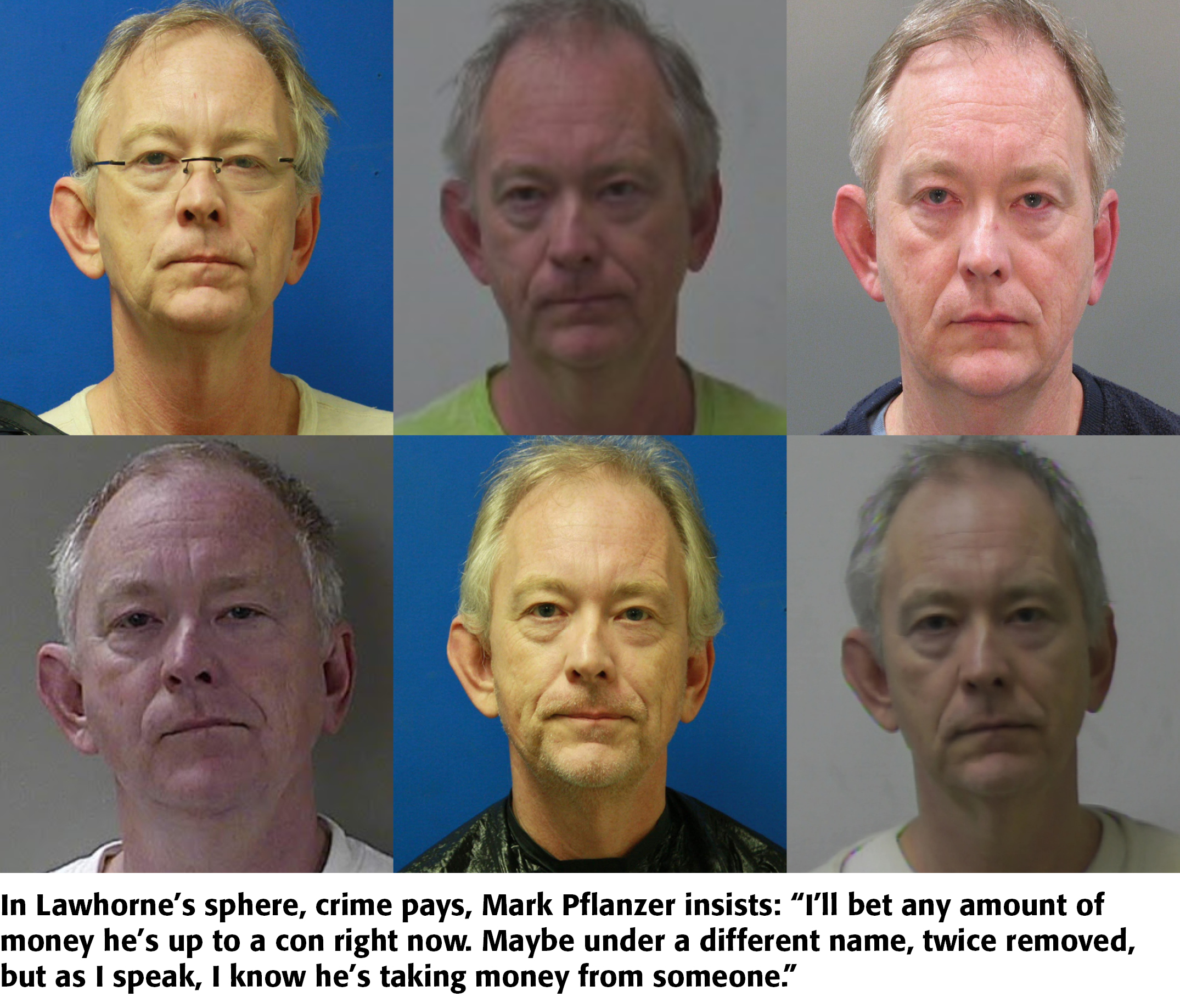
Even with a litany of stories under her belt, the Lawhorne saga sticks with Marchese. “It never fails that he comes back on the radar. So many victims who were just hard-working people willing to help their community, but in the end, they got ran over by a guy who believed his own BS.”
“He’s already done this in Tennessee and Texas,” Wooten exclaims. “He wrecked lives. The depression rate in farming is high enough already without a sociopath getting involved. This guy will steal and hurt again. Right now, mark my words, he’s working on another con.”
In Lawhorne’s sphere, crime pays, Pflanzer insists: “I’ll bet any amount of money he’s up to a con right now. Maybe under a different name, twice removed, but as I speak, I know he’s taking money from someone.”
“I have seen a lot of slippery people in my life, but I’ve never seen anything like this man,” Akers adds. “Lawhorne was the most convincing silver-tongue I’ve ever met in my life, but look how he groveled and ran. In the end, the con-man was a coward.”
For more, see:
Against All Odds: Farmer Survives Epic Ordeal
Agriculture's Darkest Fraud Hidden Under Dirt and Lies
Blood And Dirt: A Farmer's 30-Year Fight With The Feds
Killing Hogzilla: Hunting a Monster Wild Pig
In the Blood: Hunting Deer Antlers with a Legendary Shed Whisperer
Living the Dream: Honoring A Fallen Farmer
Pigs Don’t Fly: Feral Hog Spread Is A Man-Made Mess
Who Killed the Finest Soybean Soil in the World?
Hemp Fraud Hits Farmer With Clone Scam
Seeds of Discord: Crossing the Great Cover Crop Divide
The Living and the Dead: Black Vultures Expand, Farmers Pay Cost







